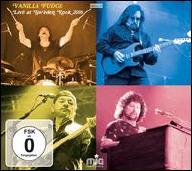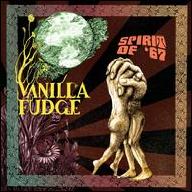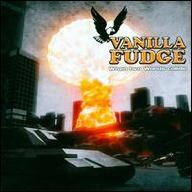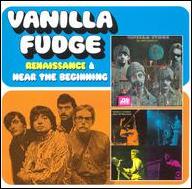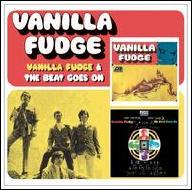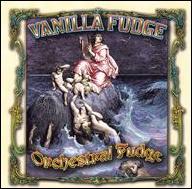Inspired by the Vagrants, another band on the club circuit led by future Mountain guitarist Leslie West, the Pigeons began to put more effort into reimagining the arrangements of their cover songs. They got so elaborate that by the end of the year, drummer Brennan was replaced by the more technically skilled Carmine Appice. In early 1967, their manager convinced producer George Shadow Morton (who'd handled the girl group the Shangri-Las and had since moved into protest folk) to catch their live act. Impressed by their heavy, hard-rocking recasting of the Supremes' "You Keep Me Hangin' On," Morton offered to record the song as a single; the results landed the group a deal with the Atlantic subsidiary Atco, which requested a name change. The band settled on Vanilla Fudge, after a favorite ice cream flavor. "You Keep Me Hangin' On" didn't perform as well as was hoped, but the band toured extensively behind its covers-heavy, jam-oriented debut album Vanilla Fudge, which gradually expanded their fan base. Things started to pick up for them in 1968: early in the year, they headlined the Fillmore West with the Steve Miller Band, performed "You Keep Me Hangin' On" on The Ed Sullivan Show, and released their second album, The Beat Goes On. Despite its somewhat arty, indulgent qualities, the LP was a hit, climbing into the Top 20. That summer, Atco reissued "You Keep Me Hangin' On," and the second time around it climbed into the Top Ten. It was followed by Renaissance, one of Vanilla Fudge's best albums, which also hit the Top 20. The band supported it by touring with Jimi Hendrix, opening several dates on Cream's farewell tour, and later in the year, touring again with the fledgling Led Zeppelin as their opening act.
In 1969, the band kept touring and released their first album without Morton, the expansive, symphonic-tinged Near the Beginning. After part of the band recorded a radio commercial with guitarist Jeff Beck, an idea was hatched to form a Cream-styled power trio with plenty of individual solo spotlights. Exhausted by the constant touring, the band decided that their late-1969 European tour would be their last. Following the release of their final album, Rock Roll, Vanilla Fudge played a few U.S. farewell dates and disbanded in early 1970. Bogert and Appice first formed the hard rock group Cactus, then later joined Jeff Beck in the aptly named Beck, Bogert Appice. Appice went on to become an active session and touring musician, working with a variety of rock and hard rock artists. Vanilla Fudge reunited in 1984 for the poorly received Mystery album, and, over the course of the next two decades, Vanilla Fudge would regroup for tours. These reunions often had differing lineups, always anchored by Carmine Appice and usually Tim Bogert, although the latter opted out of an early-'90s incarnation.
At the turn of the millennium, the group -- featuring Appice, Bogert, keyboardist Bill Pascali, and guitarist Vince Martell -- launched a more serious comeback heralded by the 2002 album The Return. Several other minor switches in the lineup followed in the next few years and, in 2007, they featured Mark Stein on vocals/keyboards instead of Pascali. That group released Out Through the In Door in 2007. More tours followed, and membership continued to revolve, with the most notable departure being Bogert in 2011. He was replaced by Pete Bremy, and Vanilla Fudge launched a "Farewell Tour" in 2011, which continued for several years. A studio album, Spirit of '67, appeared in 2015; the band described it as their heaviest work to date. Tim Bogert died on January 13, 2021 after being diagnosed with cancer; he was 76 years old. ~ Steve Huey, Rovi


